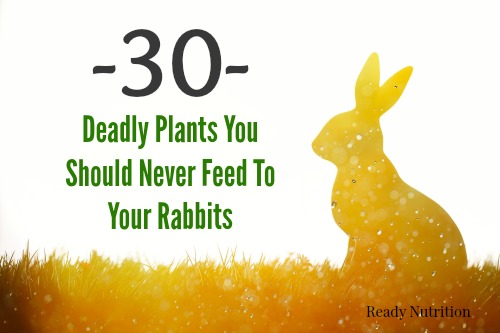In my quest for living self reliantly, I have begun taking steps to surround myself with low cost livestock choices that can serve multiple purposes. Animals that can not only provide me with meat during unstable and volatile times, but can reproduce quickly, as well as, provide me with fertilizer amendments for growing vegetables and fruits in the garden.
One such livestock choice is rabbits. Second to chickens, rabbits are a very low maintenance breed to care for. Ideally, they can be raised in suburban back yards or on a rural homestead. My family and I have three California Meat/New Zealand rabbits and if we find ourselves in a crunch, we can easily create a continuous meat source with the two does and the buck. As long as we can provide them with plenty of roughage and food scraps, then they will serve our needs.
30 Foods Not to Feed Your Rabbits
As easy as rabbits are to care for, you do need to be mindful of the kinds of foods that they eat. For a list of safe foods to feed your rabbit, click here. Rabbits that are left to graze can quickly run into mischief and eat foods that could be deemed deadly. This list is not all encompassing, but should serve as a basic guide of which plants to avoid.
- All plants that grow from bulbs
- Amarylli
- Arum lily (cuckoo point)
- Bindweed
- Bracken
- Bryony
- Convolvulus (bindweed)
- Deadly nightshade (belladonna)
- Delphinium (larkspur)
- Elder
- Fools parsley
- Foxglove
- Hellebores (christmas rose)
- Hemlock
- Henbane
- Lily of the valley
- Lupin
- Laburnum
- Most evergreens
- Oak leaves
- Poppies
- Potato tops
- Privet
- Ragwort
- Rhubarb leaves
- Scarlet runnertoadflax
- Woody nightshade
- Yew
- Chocolate
- Ivy
For a complete list of foods to avoid feeding your rabbit, click here.
Other Things to Avoid
Make sure you can identify any wild plants you feed your rabbits to ensure they are getting the right type of foods for their diet. As well, ensure that the wild edibles or grasses have not been sprayed with insecticide. Herbicides or fertilizers sprayed on grasses and plants can be deadly to your rabbit. Moreover, most insecticides will also kill your rabbit, some in very small doses. Insecticides are intentionally formulated to last a very long time, so their residue can remain for many months.
Signs of Poisoning
If you suspect your rabbit is poisoned, it is essential to act quickly as the poisoning can affect major organs and cause them to shut down. If your rabbits have any of the following symptoms, they could be poisoned.
- Loss of appetite
- Listlessness
- Weakness
- Fluctuating body temperatures
- Problems breathing
- Intestinal upset
- Seizures
Emergency Treatment Options For Rabbit Poisoning
I found these emergency treatment options online for treating rabbits who may be poisoned.
Vitamin E – Keep 1,000 mg Vitamin E on hand at all times. This is the quickest and safest way to get toxins out of your rabbit’s system. To administer Vitamin E to the rabbit, simply snip the tip off a gel cap and squirt into the rabbit’s mouth. Use this any time you suspect your bunny has gotten into something poisonous.
Activated Charcoal – Another natural lifesaver for poisoning is activated charcoal. Mix charcoal with water and get your bunny to drink it as soon as you suspect they have ingested something poisonous. As well, administering a combination of both Vitamin E and activated charcoal is an unbeatable combination.
Oral Fluids – Ensuring that your rabbit is drinking copious amounts of fluids is essential when dealing with poisoning. According to Rabbit.org, they suggest you be mindful of how much your rabbit normally drinks (normal fluid intake for a healthy mammal is approximately 90 – 100cc per kg–or about an ounce per pound–of bodyweight per day). While water is best, in an emergency, you can use unsweetened Pedialyte, an electrolyte drink designed for human infants (and available in the infant section of the grocery store). Avoid any fluids containing large amounts of sugar (even Gatorade), as these can exacerbate the overgrowth of harmful bacteria in the cecum.
Whether you are living in a suburban or rural setting, rabbits are a great animal breed to start raising. Although they are easy to care for there are food sources they should not be introduced to. As long as they steer clear of the above listed foods, then their health should be just fine. But just in case, keep these natural remedies on hand.
Happy Homesteading!
Related Articles:
Pet Corner: Herbal Remedies for Rabbit Illnesse

